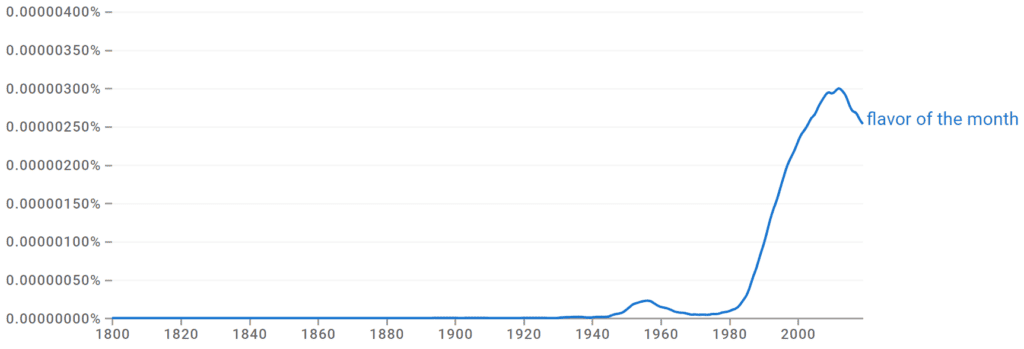Do you love ice cream? I mean, who doesn’t? Even lactose-intolerant people love ice cream! But idioms based on the delicious treat are safe for everyone, like flavor of the month. So sit tight as I quickly break down all the details surrounding how this phrase came to be!
Is Flavor of the Month an Idiom?

Indeed, flavor of the month (or flavour for our friends in Canada and across the pond) is an idiom. It’s a bit like a scoop of ice cream: it’s sweet and delightful, but it can quickly melt away if you don’t savor it. In other words, it refers to something or someone that enjoys a short period of popularity or attention before being swiftly replaced or forgotten.
Meaning of Flavor of the Month

This delicious idiom has nothing to do with your local ice cream parlor’s latest gelato creation. Flavor of the month is meant to describe a person, thing or idea that’s temporarily in vogue or particularly popular at a specific time. But, just like that trendy matcha-strawberry-rhubarb swirl ice cream, it suggests that the popularity of that person or thing will wane as quickly as it came.
Just think of celebs. There’s always some “it girl” or “breakout star” that suddenly seems to be in every T.V. show and movie. But, after a spike in popularity, they either graduate to well-known and respected actors or disappear like the flavor of the month.
Origin and Etymology Behind the Flavor of the Month

Ice cream companies, in a bid to lure in customers, would often promote a specific flavor of the month. This practice originated in the United States in the 1930s. The earliest known use of the term flavor of the month was by Sealtest ice cream in 1936. Eventually, the phrase became an idiom, expanding to include anything temporarily popular, not just ice cream.
Like the seasonal flavors themselves, the popularity of these flavors of the month would wane, making way for the next exciting creation.
Flavor of the Month Synonyms
- Here today, gone tomorrow
- Fifteen minutes of fame
- Flash in the pan
- Monster of the week
- One-hit wonder
- Short-lived sensation
Flavor of the Month Examples in a Sentence

- That new band is the flavor of the month on the pop charts, but I doubt they’ll be remembered by next year.
- Her radical theories are just the flavor of the month — people will move on to the next big thing soon.
- That low-carb diet was a flavor of the month last summer, but it quickly fell out of favor.
- The politician was the flavor of the month until his scandal broke.
- The new app was certainly the flavor of the month, but users quickly grew bored of its limited functionality.
- He seems like the flavor of the month now, but without consistent performance, he will be forgotten.
- Her style is unique, but being the fashion world’s flavor of the month can be fleeting.
- This artisanal coffee blend is definitely the flavor of the month in foodie circles.
- The flavor of the month in tech seems to be virtual reality headsets.
- He’s not interested in chasing the stock market’s flavor of the month. He prefers long-term investments.
What’s Your Favorite Flavor?
And there you have it — a taste of flavor of the month. So, whenever you see a surge in popularity — be it a person, a product or even a viral dance move — it might just be the flavor of the month. Savor it while it lasts because, like a fleeting ice cream flavor, it may not stick around for long. And remember, a firm grasp on language never goes out of style!
Check out some others we covered:
